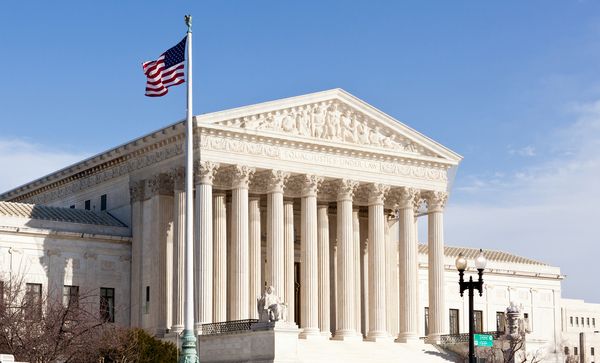Supreme Court Focuses on Legalities in DOMA Hearing

The Defense of Marriage Act got its day before the Supreme Court this morning (March 27), with arguments focused on the federal government's role in marriage and whether the law should have made it to the nation's highest court at all.
Passed in 1996, the Defense of Marriage Act, or DOMA, prevents the federal government from providing marriage benefits to same-sex couples legally wed by the states. The Obama administration, which would typically defend the law in court, is not doing so because it agrees with lower court rulings that DOMA is unconstitutional.
That fact set up nearly an hour of arguments before the Supreme Court today, with Chief Justice John Roberts questioning why the administration still enforces a law it sees as unconstitutional. Roberts also called the defense of the law by a group of Republican House lawmakers "totally unprecedented."
The justices seemed similarly skeptical on the merits of the case, United States v. Windsor. Edith Windsor is the widow of Thea Spyer, her long-time partner whom she married in Canada in 2007. The couple's home state of New York recognized their marriage, but when Spyer died, Windsor had to pay more than $360,000 in federal estate taxes because the federal government did not recognize them as spouses.
The House Republicans argued that DOMA does not penalize states for allowing same-sex marriage, but simply sets the federal government's own definition. Solicitor General Donald B. Verrilli, Jr., argued against DOMA, saying that it violates the guarantee of equal protection under the law in the U.S. Constitution. Justice Ruth Bader Ginsberg seemed to echo this concern, comparing heterosexual marriages to "full marriage" and same-sex marriages not recognized by the federal government to "sort of skim milk marriage." [Opinions on Same-Sex Marriage (Infographic)]
The justices also grappled with the question of federalism, the relationship between the states and the federal government, and whether DOMA is an example of overreach by the federal government in defining marriage for the states.
If the court decides to overthrow DOMA, it would affect same-sex couples married in the nine states (and the District of Columbia), which allow gay couples to wed. The case is unlikely to decide the issue of same-sex marriage for the country as a whole; yesterday's case over California's Proposition 8, Hollingsworth v. Perry, has a greater potential for a broad ruling, though it's not clear whether justices will take that opportunity.
Sign up for the Live Science daily newsletter now
Get the world’s most fascinating discoveries delivered straight to your inbox.
Regardless of the Court's decisions, the public is becoming increasingly supportive of same-sex marriage in nearly every demographic. Young people are most supportive, with 70 percent of those born after 1980 telling the Pew Research Center that same-sex marriage should be legal.
Follow Stephanie Pappas on Twitter and Google+. Follow us @livescience, Facebook & Google+. Original article on LiveScience.com.

Stephanie Pappas is a contributing writer for Live Science, covering topics ranging from geoscience to archaeology to the human brain and behavior. She was previously a senior writer for Live Science but is now a freelancer based in Denver, Colorado, and regularly contributes to Scientific American and The Monitor, the monthly magazine of the American Psychological Association. Stephanie received a bachelor's degree in psychology from the University of South Carolina and a graduate certificate in science communication from the University of California, Santa Cruz.











